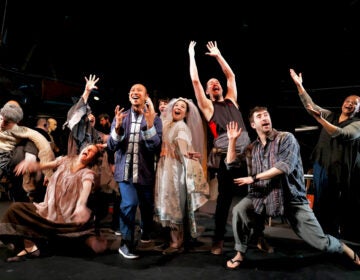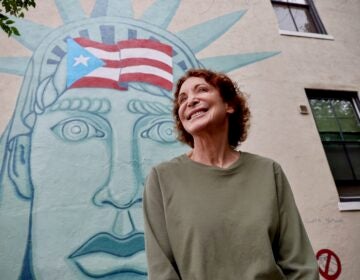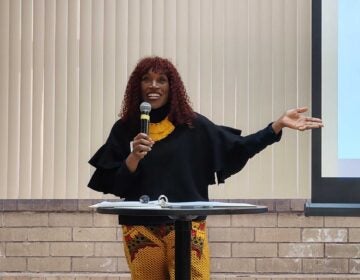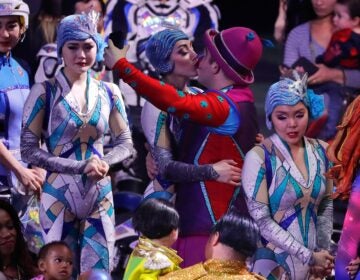Bilingual and trilingual theater take the stage at the Philly Fringe Festival
The Philly Fringe has never been shy about using multiple languages. This year, artists are pushing the envelope.
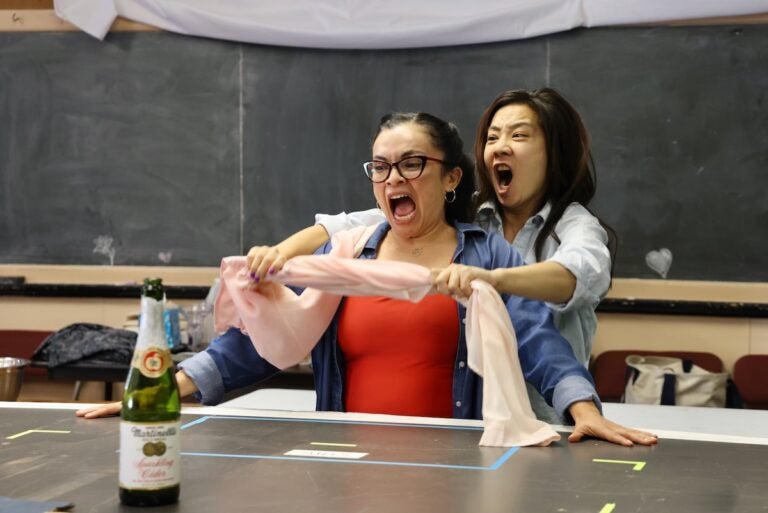
Francisca Munñoz (left) and Bi Jean Ngo rehearse a scene from ''La Otra,'' an original play performed in two languages with subtitles in English and Spanish. (Emma Lee/WHYY)
From Philly and the Pa. suburbs to South Jersey and Delaware, what would you like WHYY News to cover? Let us know!
The world premiere of Tanaquil Márquez’s “La Otra” at the Philly Fringe Festival in September has a cryptic descriptor: Three sisters meet in Bogotá, Colombia, for their father’s birthday and “an unexpected guest arrives, secrets are revealed.”
Such a premise has seeded any number of genres, from comedy to tragedy, from a horror movie to a romance novel.
In the case of “La Otra,” it’s a farce.
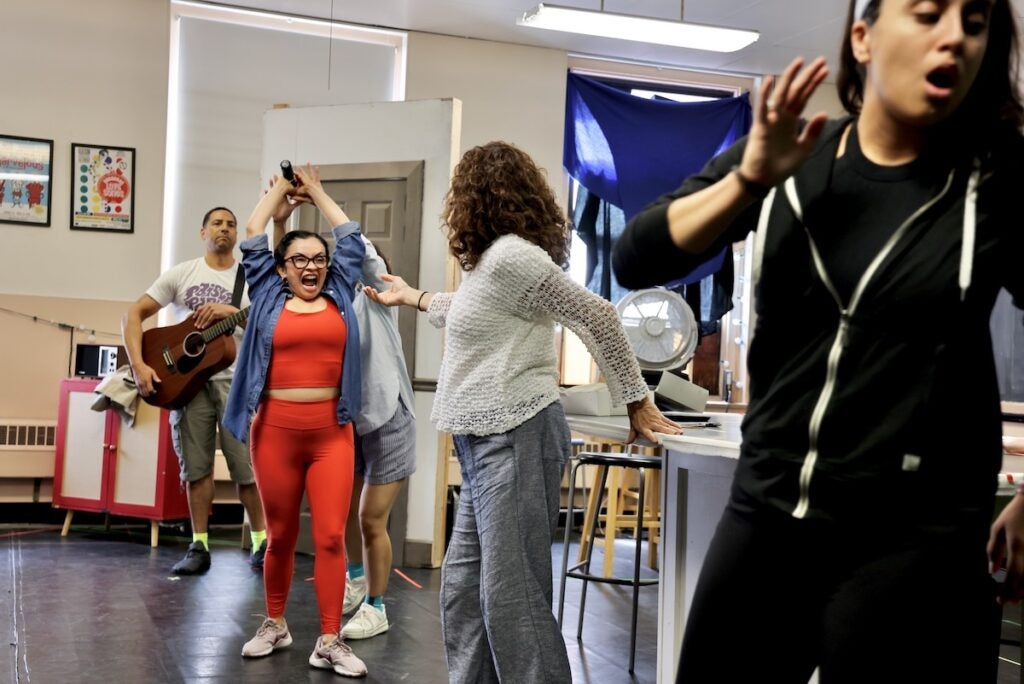
There’s a cake fight, a magical Kenny Rogers playing a live soundtrack on acoustic guitar and brawling sisters slipping in and out of Spanish and English without warning.
“Families are funny,” Márquez said. “The secrets revealed are in the kitchen. The fights are happening in the kitchen. We have different kinds of comedy, very physical comedy, slapstick-y even. We have a swinging door.”
Márquez developed “La Otra” at 1812 Productions through its Artistic Core program for fostering new work. This will be the first time in 1812’s 28-year history that one of its plays will be presented as part of the Fringe’s curated section, and its first time producing a bilingual play.
“I don’t speak Spanish,” said co-founder and Artistic Director Jennifer Childs. “We have subtitles in both English and Spanish, but the first couple of times I saw read-throughs there were no subtitles. I still laughed out loud. The portrayals of the sisters are so honest. The family dynamic is so clear. It’s just so incredibly honest and that’s where some of the best humor comes from.”
“La Otra” is honest because it’s true. Marquez really does have a patriarch in Bogota – her great uncle – with three daughters and who harbored a secret since serving in the Korean War, which came crashing down on his family decades later.
“Very much inspired by my family,” said Marquez, choosing to keep her plot twists under wraps. “I have everyone’s blessing to produce the show.”
“La Otra” is one of several plays juggling languages this year in the Fringe, a festival with a long history of presenting performances in various tongues. Thaddeus Phillips, who used to split his time between Bogota and Philadelphia, headlined at least two productions in English and Spanish. The Fringe hosted experimental theater artist Romeo Castelucci several times, whose works are entirely in Italian.
The Fringe has not been shy with languages that are intentionally incoherent. Jo Stromgren Kompani’s “Convent” (2006) was performed in an invented gibberish loosely based on Swiss German. Pig Iron Theater’s “Isabella” (2007) set Shakespeare in a morgue performed by reanimated corpses who delivered lines as barely audible mumbles.
“Because it’s Fringe, people have wide open expectations,” said Nick Stuccio, the festival’s founder and former artistic director. “Language is only a small part of how we actually communicate.”
Saying the unsayable in Turkish and Spanish
This year, “El idioma de lo silenciado: The letters that were never sent” will be performed at the Fringe Festival in Spanish and Turkish – the respective native languages of collaborators Lucia Bedoya and Faysal Can Dakni – as well as in English.
Bedoya lives in Bogotá. Dakni lives in Ankara, Turkey. They met in Shanghai, China, in 2016 while attending an opera workshop. Their only shared language is English, and each wanted to learn the other’s native tongue.
“Sometimes I was speaking to Lucia in Spanish and she was correcting me. She was trying to speak in Turkish and I was correcting her,” Dakni said. “What was really interesting is that I can understand Lucia better when she’s using Spanish, even though my Spanish is not that strong. Something clicks. Spanish and Turkish, somehow, they’re clicking. Not grammar-wise, but in the sensations or metaphors these two languages are using.”
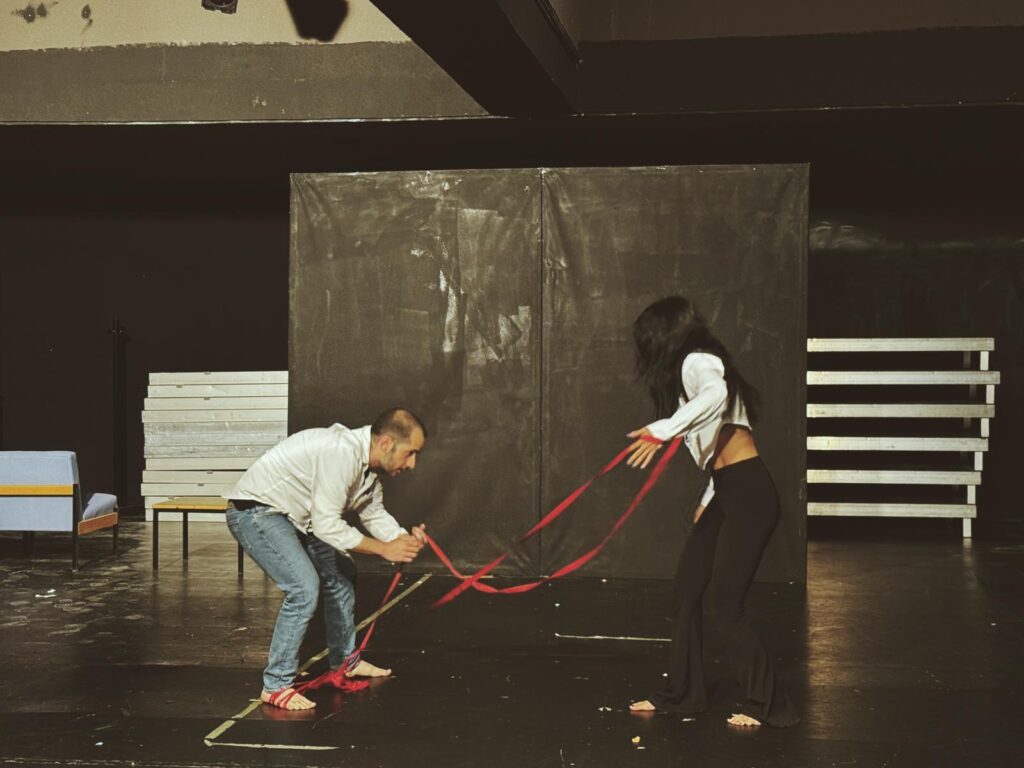
“El idiom de lo silenciado” is an abstract, non-linear performance in four parts exploring through text and movement the emotional absence created when something is left unfinished, such as a relationship.
“The yearning, the will to say something that we don’t know how to say,” Bedoya said. “We are trying to figure out in these four pieces how you can say something that you couldn’t say at that moment.”
“In this project, we are never looking for a story. There are no characters,” Dakni said. “There are four fragments in this piece, and every scene is different.”
There are no subtitles, either. When English, Turkish or Spanish is spoken, audience members who are not familiar with the language will not know what was said. But Bedoya believes people will still understand the intention.
“In the first state of the language when a kid is learning, they don’t get each word. But they understand impulse. That is the first step,” she said. “You have to be as open as a baby.”
Theater of Sign Language
A new Philadelphia company, Antihero Theatre, will present its debut production at the Fringe Festival, “Zap!,” a science fiction/fantasy murder mystery performed in American Sign Language.
“Zap!” is set in an alternative universe where humans and a nonhuman anthropomorphic species coexist, but not without friction. An ancient set of sacred rules, the Sky Laws, have been imposed since time immemorial to govern this world, but those laws are not always followed.
“Zap!” will be performed with eight actors: Four deaf actors will be using American Sign Language, each assigned a voice performer who will be speaking their ASL lines in English.

Antihero Theatre was founded by Daniel Brucker and Beth Applebaum, two deaf theater artists who met while studying at Rochester Institute of Technology. Applebaum moved to New York City where she performed with the National Theater of the Deaf and several deaf-oriented off-Broadway shows.
Brucker moved to Philadelphia where he teaches at the Pennsylvania School for the Deaf. He discovered the city had no theater focused on the deaf community. So Brucker and Applebaum started one.
“We aspire to present works done in ways that reflect, engage, and elevate deaf and hard of hearing experiences,” read the Antihero Theatre’s statement “The good, the bad, and the antihero.”
The production is designed for deaf and hard of hearing audiences, but the story being told does not center the deaf experience. It is a fantasy police procedural story of murder and mythology dictated only by its creators’ imagination.
“When the script of ‘Zap!’ was written, American Sign Language and Deaf culture weren’t implemented at all,” Brucker wrote in an email. “However, when the decision was made that we would do this with deaf cast members performing in ASL, we had to make some minor changes to ease the translation from written English to ASL.”
“Zap!” is Antihero’s first step as a new company. Brucker and Applebaum have not yet considered what comes next, but hope to appear again in Fringe 2026.
“We are open to collaborations with other theater companies!” Applebaum wrote.

Get daily updates from WHYY News!
WHYY is your source for fact-based, in-depth journalism and information. As a nonprofit organization, we rely on financial support from readers like you. Please give today.




